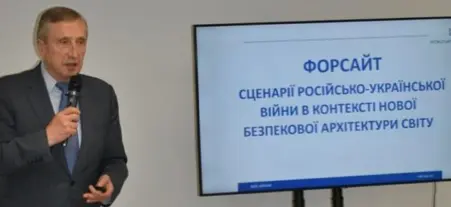Conferences and Seminars
Contemporary Mathematicians in AI
YouTube
Seminar under the guidance of Academician Mykhailo Zgurovsky and Corresponding Member of the National Academy of Sciences of Ukraine Pavlo Kasyanov.
1.01.2025
An international leaders’ conference titled "Europe and Ukraine – Shared Perspectives and Values"
Vienna Diplomatic Academy (Austria)
The conference brought together educators, scientists, religious and public figures, and media representatives – all those concerned with finding ways to establish sustainable peace. Among the delegates from the Ukrainian Peace Council was M. Zgurovsky — Head of the Ukrainian Peace Council, Academician of the National Academy of Sciences and the National Academy of Pedagogical Sciences of Ukraine, Foreign Corresponding Member of the Austrian Academy of Sciences, Doctor of Technical Sciences, Professor (online).
13.12.2024
Main Threats to the Sustainable Development of Global Society in a Conflicting World
Kyiv National Economic University named after Vadym Hetman
The organizers of the forum — the Ukrainian Peace Council, Kyiv National Economic University named after Vadym Hetman, the Institute for Economics and Forecasting of the National Academy of Sciences of Ukraine, the Ukrainian League of Industrialists and Entrepreneurs, the Ukrainian Foreign Policy Association, the All-Ukrainian Innovation Ecosystem "Sikorsky Challenge Ukraine" (SCU), the IPO "Council for Environmental Safety", and nearly a dozen other co-organizers, including the Ministry of Economy and the Ministry of Education and Science of Ukraine — set out to discuss the prospects and directions of Ukraine’s post-war economic recovery. Considering the international significance of Ukraine’s post-war recovery, the forum participants decided to appeal to the Ministry of Foreign Affairs of Ukraine with a proposal to submit to the UN Economic and Social Council the idea of discussing this issue on the platform of the UN European Economic Policy. Summing up the results of the forum, the head of the Ukrainian Peace Council, academician of the NAS of Ukraine M. Zgurovsky, drew attention to several points. — Participants expressed unanimous support for the state in this extremely challenging time, — he noted. — Key directions for recovery were identified, which should become the foundation for building a modern, innovative, and economically self-sufficient country. Achieving this goal is possible only through a systematic approach, international support, and implementation of decisive reforms. According to M. Zgurovsky, the forum also became an important step in mobilizing resources and efforts for the implementation of the President of Ukraine’s Resilience Plan and in consolidating the international community around this strategic goal. In addition, the forum brought together representatives of the authorities, politicians (regardless of their party affiliation), civil society, and international partners around the common idea of Ukraine’s revival. Acad. Zgurovsky is convinced that, since the revival of Ukraine is a long-term process, planned over decades, it is important that the forum does not remain a one-time event. Therefore, it is necessary to continue the initiated intellectual dialogue by creating a permanent expert platform for government officials, politicians, business representatives, and international partners. In total, more than 500 participants from 16 countries took part in the forum. Within its framework, under the auspices of Sikorsky Challenge Ukraine, a Festival of High-Tech Innovations was held, showcasing startups from all over Ukraine.
20.11.2024
Main Threats to the Sustainable Development of Global Society in a Conflicting World
Institute for Advanced Study (IAS) Integrative Research Institutes Technische Universität München
Scientists Meet Scientists – TUM-IAS Wednesday Coffee Talk | Seminar Series of European Universities on Sustainability by Prof. Michael Zgurovsky. This study analyzes the development patterns of systemic world conflicts that have occurred from 750 BC to the present. Through the intellectual analysis of big data on these conflicts, a Fibonacci pattern in their progression over time was identified. An attempt was made to predict the next global conflict, referred to as the "conflict of the 21st century." The study examined the nature of this conflict and identified the main global threats that shape it, influencing the sustainable development of the global community. Hypotheses were developed regarding the metric relationships among global periodic processes, specifically: the Kondratiev cycles of world economic development, the sequence of 11-year solar activity cycles, and the process of evolutionary structuring of the C-wave family of world systemic conflicts. An effort was also made to forecast these processes in the 21st century, along with recommendations for organized actions by the global community to promote sustainable development.
30.10.2024
Seminar "Strategic Level of National Security and Defense"
Igor Sikorsky KPI
The seminar was organized by the Institute for Advanced Defense Technologies of Igor Sikorsky KPI, the company Sonata, and the Sikorsky Challenge innovation holding. The event was attended by representatives of the Defense Forces, defense industry enterprises, and research institutions. Analysts, under the leadership of Academician M.Z. Zgurovsky, compared the points of the Ukrainian Peace Formula with those of the so-called “Erdogan peace plan.” Acad. Zgurovsky noted that, in the end, out of the 10 points of the Ukrainian formula, there is overlap with only four points of the second plan. On the remaining six points, no convergence exists. This means that, with a high degree of probability and in the absence of a negotiation basis, the war will continue — this year and, most likely, into the next. Possible scenarios for ending the war based on balancing the interests of the main power centers — the U.S., the U.K., and the European Union on one side, and China and russia on the other — were also presented. In addition, attention was drawn to the reorientation of russia’s economy toward a war footing. Researchers analyzed the state and potential of its strategic industries, the real situation regarding sanctions evasion, the dynamics of changes in GDP and the National Welfare Fund, and many other factors. As a result, the researchers forecasted that, under current conditions, russia may still be able to wage war for another 4.5 to 5.5 years.

20.05.2024